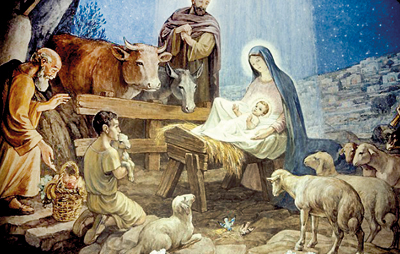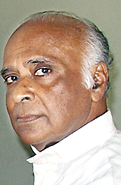Killjoy Pope crushes Christmas nativity traditions
With just under 34 days until Christmas, the Pope has put a dampener on the festive period by rubbishing the idea that donkeys or any other animal have a place in the traditional nativity scene.
Benedict XVI also claims angels never sang to the shepherds to proclaim Christ birth’s — trashing the much-loved carol ‘Hark! The herald angels sing’ in the process.

Traditional: This depiction of the Nativity is mirrored in homes and churches all over the world at Christmas but the Pope says that it should not include a single animal
From this falsehood the tradition of singing carols was born, the Pope says. His views are revealed in his latest and last installment of three volumes on the life of Jesus, released today, which is set to be a worldwide bestseller.
Almost every Christian church in the world will soon be blowing the dust off its traditional nativity set with its array of animals but the Pope is clear that it would not have included any beast whatsoever.
St Peter’s Square itself regularly has a giant scene at Christmas and has displayed an array of animals at the heart of the Vatican, but the Pontiff is certain that is wrong.
‘In the gospels there is no mention of animals,’ he writes, saying that they were probably a Hebrew invention of the seventh century BC, as outlined in the Book of Habakkuk.Habakkuk was the eighth book of 12 minor prophets in the Old Testament.
In Christian tradition, he is regarded by some as a prophet who predicted the nativity.Scenes relating to the birth of Jesus, as described in the Gospel, do not directly refer to the presence of an ox and donkey.
But in Habakkuk 3:2, it is written: ‘In the midst of the two beasts wilt thou be known’ – and this was one of the sources which inspired the presence of the creatures at the manger.
(It is worth noting that another Old Testament prophet, Isaiah, also inspired the manger scenery, with his words from 1:3: ‘The ox knows its owner, and an ass, its master’s manger’). However, the Pope is convinced despite debunking the theory, the tradition is here to stay, saying: ‘No nativity scene will give up its ox and donkey’, he said.
‘Jesus of Nazareth: The Infancy Narratives,’ hits bookshops in 50 countries on Wednesday, the third and final installment of a project the 85-year-old Benedict conceived a decade ago and began writing soon after he became pope in 2005.
The first two books, which topped the bestseller lists in Italy, dealt with Jesus’ public ministry and his death, leaving just Jesus’ birth to complete the series. More than 1 million copies are planned for the initial print run, just in time for Christmas.
In the book, Benedict blends history, theology, linguistics and even astronomy to interpret the Gospels of Matthew and Luke, which describe the months just before and after Jesus’ birth.
But there is one part of the nativity story he is firm on – that Mary was a virgin and Christ was conceived with the Holy Spirit alone. In the section ‘Virgin Birth – Myth or Historical Truth?’ he says: ‘The accounts of Matthew and Luke are not myths taken a stage further.
‘They are firmly rooted, in terms of their basic conception, in the biblical tradition of God the Creator and Redeemer.’
But he added that Angels delivered to good news of Jesus’s birth to shepherds by speaking them, not singing them as the gospels say. ‘According to the evangelist, the angels “said” this,’ the Pope writes, adding: ‘But Christianity has always understood that the speech of angels is actually song, in which all the glory of the great joy that they proclaim becomes tangibly present. ‘To this day simple believers join in their caroling on the Holy Night, proclaiming in song the great joy that, from then until the end of time, is bestowed on all people.’
And he also admits that Jesus would have been born years earlier than the Christian calendar states. For years, many historians have said Jesus would have been born around 4BC, but for the Pope to admit a flaw in something so fundamental to Catholic faith is surprising.
Pope Benedict was born Joseph Aloisius Ratzinger in Marktl, Germany, in 1927. As a 14-year-old during World War Two, he was forced into the Hitler Youth, even though his Bavarian parents despised the Third Reich. He was appointed the head of the Roman Catholic Church in April 2005.
Last month, he delivered a prayer in Arabic for the first time during his weekly general audience. More than 20,000 people heard the Pope’s prayers in Arabic, part of a new effort by the Vatican to show support for Christians in the Middle East.
THE MYTH OF NATIVITY, ACCORDING TO THE POPE
Three wise men make their way to the manger… or did they?
In the latest instalment of his book series, Pope Benedict XVI has this to say on the subject of the birth of Jesus…
No donkey: No donkeys or any other animal have a place in the traditional nativity scene – they were a 7th century BC Hebrew invention, relating to the Book of Habakkuk.
Habakkuk was the eighth book of 12 minor prophets in the Old Testament. In Christian tradition, he is regarded by some as a prophet who predicted the nativity.
Scenes relating to the birth of Jesus, as described in the Gospel, do not directly refer to the presence of an ox and donkey.
No singing angels: Angels never sang to the shepherds to proclaim Christ’s birth – they just spoke, according to Pope Benedict. And it is from this falsehood the tradition of singing carols was born.
© Daily Mail, London
Follow @timesonlinelk
comments powered by Disqus


















